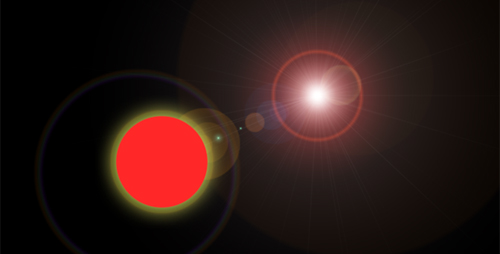
The Photonucleic Effect
|
The photonucleic effect is a very specialized astronomical phenomenon. It takes place when an object native to the influence of a red giant star enters the influence of a small G-type star. Every object in the Universe, organic or inorganic, has a distinctive signature based on the geological and cosmological characteristics of the environment in which it was formed. Rock from a planet whose gravitation is light would be less dense than rock of the same atomic structure, but from a world like Krypton whose gravitation is greater. Similarly, the musculature and cellular density of an animal born on one world must be different from that of the same species of animal born on another, or in deep space. The gravitation and magnetic fields acting on a creature during its growth necessarily define its eventual form as surely as does its genetic code. In fact, if twins with identical genetic codes were born in space, and one was raised on dense Krypton and the other on Earth, the one raised on Krypton would be far stronger than the one raised on Earth—assuming the Kryptonian twin survived at all. This is all, of course, no more than a thought experiment. It almost never happens. Inorganic matter that originally formed in the orbit of a red giant like the star of Krypton almost never makes its way around interstellar space into the system of a yellow star. It is simply unlikely in the extreme. When, rarely, it does happen, it tends to develop an unstable and unpredictable radioactivity at the molecular level. Rocks spray off a steady stream of isotopic particles that may have unpredictable effects on their surroundings. A particle of the remainders of the world of Krypton might glow with what appears to be a rainbow light and its radiation could cause a plant to mutate irrationally. Organic exiles of a red giant star system are particularly susceptible to the inorganic radioactivity of elements with the same cosmological signature. But organic matter from the vicinity of a red giant—the living chemistry of plants and animals—has a wholly different response to yellow star-sun influence. Where non-living matter becomes unstable and radioactive with this dislocation, living things develop an enhanced stability. The first thing that happens under the photonucleic effect is that the nucleus of each of an organic creature's cells grows a carapace—a temporary shell that shields it from external harm. This happens very quickly, from the outside of the organism - the cells in direct contact with yellow starlight—to the most internal cells of the organs, in less than the time it takes to draw a breath. For a moment, the organism is suspended in a comatose state, but the moment is too brief to notice. In that moment, the nucleus of every atom in the organism quakes. Each electron in every carbon or hydrogen atom in every molecule of its body jumps outward by one quantum level. The nucleus unbinds, its protons and neutrons and other subatomic particles loosening, expanding the binding space between them by the merest fraction of an angstrom. The molecules of the transplanted being's body do not actually grow, but the physical space that the solid parts of them take up thus increases exponentially without increasing the organism's actual mass or proportions. The organism becomes harder, tougher, more durable, better able to navigate the changed environment in which it now finds itself. Perhaps something in the biology of those rare humans and canines and other chunks of biomass that were able to survive and eventually flourish in the vicious environmental soup of Krypton allowed for this response to such a displacement. Maybe it was simply a cosmic joke. Certainly the photonucleic effect was one of those delicious little bonuses built into the Universal circumstance back before that instant of Creation that Earthers call the Planck Epoch: the conception, under a supremely implausible nexus of events, of a theoretical super-being. |
First explained in Starwinds Howl, 1999, by Elliot S! Maggin